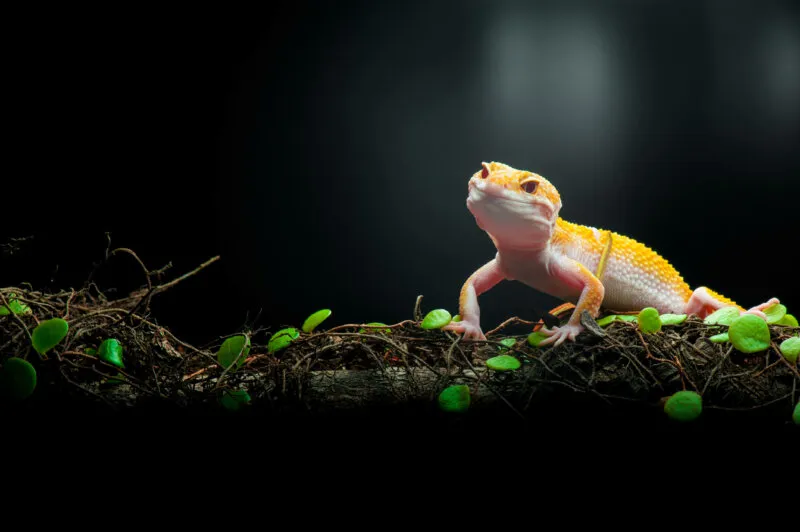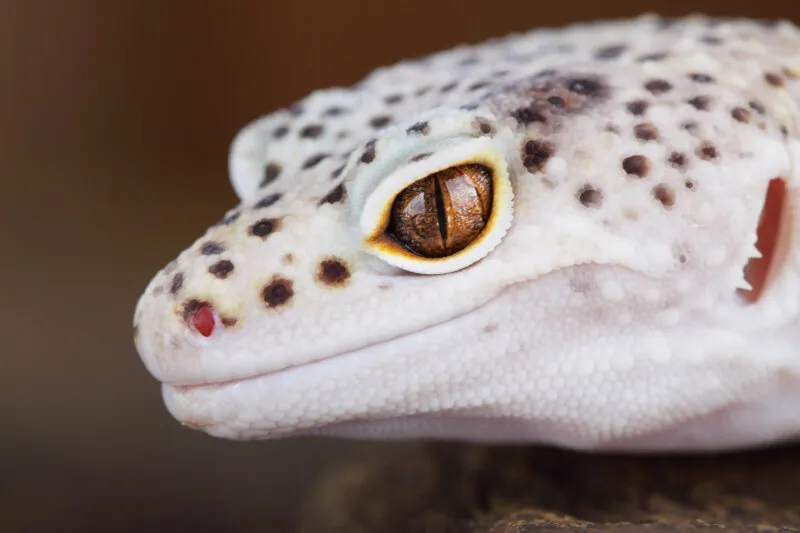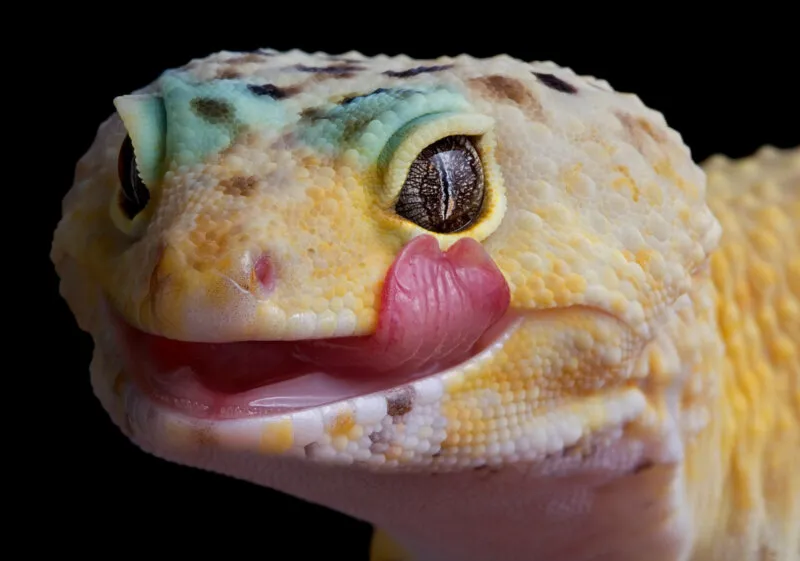If you’re a leopard gecko lover, you’ve probably seen photos or videos of leopard geckos eating fruit. You’re right to ask whether leopard geckos should be eating fruit as part of their diet.
Leopard geckos are insectivores and should therefore never eat fruits. Their digestive systems don’t have the enzymes that are needed to digest
In this article, we’ll take a deeper look at why you shouldn’t feed your leopard gecko fruit, what the best treats for your leo are, and how you can ensure that your leopard gecko gets all the nutrients that are in fruit in a healthy way for them.
Why Leopard Geckos Can’t Eat Fruit
Unlike some types of pet reptiles, like bearded dragons, which are omnivores, leopard geckos are insectivores and only feed on insects.
In Short, This Is What Happens When You Feed A Leopard Gecko Fruit
| Digestion | Leopard geckos can’t digest fruit and other plant material.Because the |
| Sugar | Sugar can cause plaque build-up in their mouths which can, in turn, lead to ulcerative stomatitis in the medium term and death in the long term. |
| Calcium/Phosphorus Ratio | Leopard geckos need to ingest calcium and phosphorus at a rate of 2:1. Calcium deficiency causes metabolic bone disease (MBD) in the medium term and leads to a prolonged and painful death in the long term. |
| Hypo- and Hypervitaminosis (A deficiency of a specific vitamin, or toxicity caused by too much of a particular vitamin.) | Fruit can throw your leo’s vitamin levels completely out of balance. Deterioration can be quick depending on the level of vitamin toxicity.Secondary infections, caused by a deficiency or toxicity, can kill your leopard gecko in the long term. |
| Insecticides and pesticides | Non-organic fruit can contain traces of insecticides or pesticides. These poisons can harm your leopard gecko in the short, medium or long term, depending on the amount of poison that they ingest. |
1. Their Digestive Tract Can’t Digest Fruit
Leopard geckos don’t have the digestive enzymes or a cecum (a structure between the small and large intestine) that are required to be able to digest the cellulose in plants.
This means that, even if your leo eats some fruit, they will not be able to digest it, which can make them ill.
Your leo’s digestive tract is also not as acidic as that of herbivores.
Tip: Wanna know what human foods leopard geckos can eat? Read this article!
2. Sugar Is Bad For Your Leopard Gecko
Fruits are sugar-rich, which is bad news, as the sugar can cause plaque build-up in their mouths, just like in humans.
This plaque build-up can lead to mouth rot (Ulcerative Stomatitis); an illness that affects the mouth and – if left untreated – can kill your leopard gecko.
Further, too much sugar could lead to diabetes, fatty liver disease, and other diseases. Yes, leopard geckos can get those diseases!

3. The Calcium/Phosphorus Ratio And Why It’s So Important
The minerals calcium and phosphorus are required together to build strong bones, but calcium is also needed to build eggshells and are used in muscles and in the everyday working of cells.
However, too much phosphorus or calcium can lead to an imbalance that limits the absorption and use of calcium in the leopard gecko’s body.
The correct calcium to phosphorus ratio for leopard geckos are 2:1.
The Calcium/Phosphorus Ratio Of Fruit
When you look at the phosphorus and calcium ratio of fruit, you’ll notice that fruit contains very little calcium and can contain a lot of phosphorus.
Therefore, besides your leo not being able to digest the fruit, you can also throw their calcium and phosphorus levels off completely by feeding them fruit.
The Calcium/Phosphorus Ratio Of Feeder Insects
Although the feeder insects that leopard geckos eat (crickets, mealworms, roaches, etc.) aren’t perfectly balanced when it comes to their calcium/phosphorus ratio, they can be supplemented to achieve this balance.
Keep reading to find out how to do this.
A Calcium-Deficient Diet And Metabolic Bone Disease
If your leopard gecko’s diet is calcium-deficient, it can lead to a devastating illness called Metabolic Bone Disease. This disease, if not caught very early and treated, will inevitably lead to a very painful and prolonged death for your leo.
A Calcium deficiency can be exacerbated when feeding your leopard gecko fruit and heightening the phosphorus levels in their bodies so that they can’t absorb or make use of the calcium that they do ingest.
Worried that your leopard gecko already has a calcium deficiency? Look out for these symptoms and take your leo to the vet immediately if they have these symptoms:
Early Symptoms Calcium Deficiency
- Low energy levels
- Lack of appetite
- Twitching toes
Advanced Symptoms of Metabolic Bone Disease
- Swollen jaw
- Swollen legs
- Curved spines
- Paralysis
- Rectal prolapse
(Source: Leopard Geckos, Lake Shore Pet Hospital)
4. Hypo- And Hypervitaminosis (Vitamin Deficiencies And Vitamin Toxicity) Due To Fruits
If your leopard gecko has either hypovitaminosis (a deficiency of a vitamin or vitamins) or hypervitaminosis (toxicity caused by too much of a certain vitamin in your leo’s body), they can develop severe symptoms that could lead to secondary infections and death.

Should you feed your leopard gecko fruit, you may be feeding them something that could tip the vitamin scale, so to speak.
Instead of your leo getting the nutrition they need to be healthy, you may be making them sick because of the shifting vitamin (and mineral) levels in their bodies!
The vitamins that are the most likely culprits of these diseases are vitamin A and vitamin D. Today’s Veterinary Practice notes that herbivorous reptiles only seldom suffer from a vitamin A deficiency because of their plant-based diet.
However, feeding your leopard gecko fruit in order to give them the vitamin A that their bodies require for normal “epithelial tissues, vision, growth, reproduction, and immune function” will most likely backfire.
This is because they lack the capacity to properly digest the vitamin A precursors, like beta-carotene, that are found in plants.
Symptoms Of Hypervitaminosis
The symptoms of hypervitaminosis – a toxic amount of specific vitamins in the body – include:
- Dry, scaly skin
- Skin ulceration and/or sloughing
- Depression
- Lethargy
- Anorexia
- Weight loss
- Dehydration
(Source: Today’s Veterinary Practice)
Tip! Keep reading to find out the best way to add vitamins to your leopard gecko’s diet – that doesn’t include feeding them fruit.
5. Insecticides And Pesticides
Should you feed your leopard gecko fruit that’s not organic, you take the chance that you feed them some insecticides or pesticides by accident as well.
Although normal exposure from fruit that has been properly washed won’t kill your leopard gecko, exposure may cause some metabolic stress.
The metabolic stress that can be caused by insecticides or pesticides will have some impact on the health of your leopard gecko in the short and long run.

Therefore, besides the fruit themselves not being healthy for your leopard gecko, the negative impact of the fruit is compounded by the exposure to the different poisons.
Tip! Feed your feeder insects organic produce as far as possible, as this will remove the chance of possible exposure to pesticides or insecticides.
The One Occasion When You Can Feed Your Leopard Gecko Fruit
(No, it’s not on their birthday…)
There is a time when you can feed your leopard gecko fruit – when it’s prescribed by your vet as part of a smoothie (kind of) when they’re recovering from certain illnesses.
Only do this, however, when your vet prescribes this and then also only use the fruits (or vegetables) that your vet tells you to use and only for the time that your vet prescribes.
For example, you won’t be able to use those fruits that you can’t gut-load your feeder insects with. Keep reading for a list of fruit that you should avoid when feeding your leopard gecko’s feeder insects.
How To Ensure That Your Leopard Gecko Gets The Nutrients Of Fruits Without Feeding Them Fruits
If you’re worried that your leopard gecko won’t get all the nutrients they need if you don’t feed them fruit, you can stop worrying as there is a way of giving them these nutrients indirectly; through gut-loading.
What Is Gut-Loading?
Gut-loading is a way of feeding the feeder insects you’re going to give to your leopard gecko in a way that they are at their most nutritious when they are being consumed.
Besides feeding the feeder insects to gut-load them, the insects are also dusted with supplement powder(s) in order to ensure that your leo gets all the nutrition they need from their insect-only diet.
How To Gut-Load Feeder Insects For Leopard Geckos
Gut-loading should take place 24 – 72 hours (though preferably between 24 – 48 hours) before feeding the insects to your leopard gecko.
The same method is used for all feeder insects, i.e. mealworms, crickets, dubia roaches, and other acceptable kinds of worms.
To gut-load, feed the insects you’re going to feed to your leo a mixture of nutritious fruits and vegetables (those you should avoid are listed below).
Although some owners feed the insects on fish flakes or other types of pet
Tip: Bug grub is quite easy to find in pet shops – especially those who sell live feeder insects. You can always supplement the insects’ diet with this
food , or use it in a pinch when you’re unable to give the feeder insects freshfood . Bug grub is also easy to use by someone who’s looking after your leo while you’re away from home and aren’t used to having to gut-load insects.

Fruit (And Veggies) You Shouldn’t Feed Feeder Insects
Because some fruits (and vegetables) can be harmful to your leopard gecko, you also shouldn’t feed these to the feeder insects you’re planning on using.
The fruit and veggies that you should avoid feeding your leo’s feeder insects, include:
- Citrus fruits (oranges, grapefruits, etc.)
- Avocado
- Beans
- Onions
- Tomatoes
Foods that you can feed your feeder insects, include:
- Apples
- Bananas
- Carrots
- Leafy greens (preferably dark green)
- Potatoes
- Sweet potatoes
Supplement Powders: Calcium, Phosphorus, And Vitamins
Because your leopard gecko can’t eat fruit and other plant matter, their diet should also be supplemented by dusting the feeder insects with calcium and vitamin powder.
The calcium supplement will also usually contain vitamin D3, which is important for the use of calcium in your leopard gecko’s body.
These powders are readily available at pet shops that sell live feed and are easy to use.
The Best Treats For Your Leopard Gecko That Are Not Fruits
Even though fruit is off the menu for your leopard gecko, it doesn’t mean that you can’t give your leo a little treat every now and then. It just means that that treat should come in the form of a gut-loaded insect and not just a piece of fruit.

There are actually many insects that your leopard gecko can eat besides mealworms, crickets, and dubia roaches.
However, some of these are very high in fat and should only be an occasional treat (so they can have some extra special bugs on their birthday rather!).
Some of the insects that you can consider for a treat for your leopard gecko are:
- Waxworms
- Butter worms
- Silkworms
- Phoenix worms
- Hornworms
Note! Never catch any bugs around the house or outside to feed to your leopard gecko. They may be carrying diseases or have been exposed to insecticides. And never, ever feed any bug that glows (like fireflies) to your leopard gecko as they are highly toxic to leos.
Conclusion
Leopard geckos cannot digest fruit and should never be given any (even as a treat), as doing so can lead to other health complications in the medium and long term.
Even though leopard geckos should not be fed fruit (or vegetables -here is why), that doesn’t mean that they can’t have a balanced diet that is suited to them specifically.
By feeding your leopard gecko only insects that have been gut-loaded and dusted, you’ll ensure that your leo gets the nutrition they need for a long and happy life with you.
- Enchi Ball Python: A Unique and Stunning Morph of Python regius - March 27, 2025
- Emerald Tree Monitor: The Enigmatic Green Guardian of the Rainforest - March 26, 2025
- The Egyptian Cobra (Naja haje): A Fascinating Serpent - March 25, 2025
